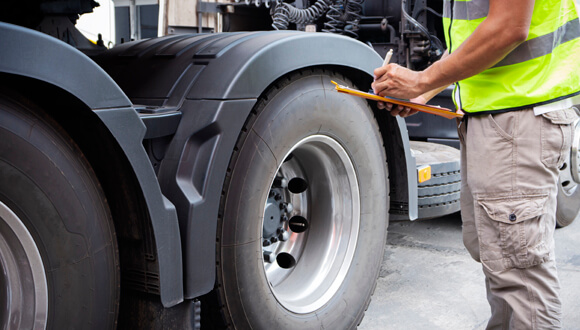The importance of vehicle inspections
19/05/2022 00:00:00by Mark McKenna19/05/2022 00:00:00The importance of vehicle inspectionsBluedrop Services


Regularly inspecting your fleet vehicles is an essential part of avoiding breakdowns, accidents, and costly call-outs on the road. It can also help you to lower your fleet insurance premiums. Here we look at some of the key things you and your drivers should be doing to maintain your fleet vehicles.
Why should you inspect your fleet regularly?
When your business relies on vehicles to turn a profit, even just one car off the road can have a detrimental impact on delivery schedules, productivity, and your ability to fulfil contracts with clients.
Vehicles that are left unchecked and allowed to depreciate can also threaten the safety of your driver and other road users which, as an employer, the company would ultimately be liable for.
That’s why a fleet inspection programme is so important.
Not only does regularly inspecting your fleet flush out any small issues that, if not tackled early, could result in bigger repairs down the line, it can also help to reduce your fleet running costs overall, and have a positive impact on lowering your fleet insurance.
So, what should a vehicle inspection consist of?
As a fleet operator you have a legal responsibility to ensure every vehicle in your fleet is in a roadworthy condition each time it’s being used.
While that may sound like a lot of upkeep, on a day-to-day basis this involves nothing more than just a few simple checks you or your drivers can easily perform in a couple of minutes before setting off each morning.
Your daily fleet inspection should consist of assessing the inside and outside of the vehicle to ensure everything is functioning correctly and in good working order.
These checks should include making sure the lights, hazard lights, and brake lights are all working. You should also inspect your tyres (pressure and tread) for wear and tear, as well as checking that the engine oil and other fluids are all topped up to the required levels.
Here’s a quick checklist you can work through to help you inspect your fleet each morning:
1. Check your tyres
You’re looking for any tears or deep cuts as well as the inflation levels. If you can see any of the tyre’s cords, replace the tyre immediately. This is illegal and should be treated as an urgent repair. Also check that the wheel nuts are securely fastened.
2. Look for external damage
Have a quick sweep of the vehicle to ensure the bodywork is all ok and that there are no dents or damage, such as a chipped light or broken wing mirror. If you notice anything that wasn’t there the previous day, report it to your fleet manager so they can make a record.
3. Test your lights
You’ll need another driver to help you perform this check. Try each of your lights in turn (hazards, brakes, reverse) to ensure that everything is working as it should be. Also test your indicators to make sure these are functioning too.
4. Try your horn, wipers, and seatbelt
Remaining inside the vehicle, spare a few moments to check that your horn is sounding when you press it, that your seat belt is locking into place, and that your windscreen wipers are working (including the wiper spray). Top up the wiper fluid if it’s empty or running low.
What are the benefits of regular fleet inspections?
Inspecting the condition of your fleet vehicles delivers a number of cost and safety benefits. It is also integral to staying within the correct side of the law and preventing avoidable accidents on the road.
Here are just some of the benefits of regularly inspecting your fleet:1. Less downtime
Preventative maintenance plays a huge role in extending the lifespan of your vehicles. Conducting these checks each day could help you to avoid one or more of your fleet vehicles being taken off the road unexpectedly, saving you time and money in the long-term.
2. Lower fleet insurance premiums
Conducting daily safely and roadworthiness checks demonstrates to your insurer that you take your responsibilities to your drivers and other road users seriously. This can help to reduce your fleet insurance premiums, saving you hundreds of pounds each year.
3. Legal compliance
As an employer it is your legal responsibility to ensure that any equipment your employees use is properly maintained and in good repair. Neglect the upkeep of your vehicles and you could be held accountable by the law and even face criminal prosecution.
Return to blog menuWant to find out more about Bluedrop's Motor Fleet Insurance?
Call our friendly team now for the right insurance cover - at the best price
+441489780491
Calls recorded for training and quality.



 Privacy and Cookie Policy
Privacy and Cookie Policy